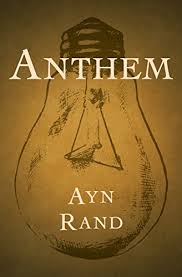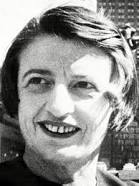Anthem Page #2
Anthem is a dystopian fiction novella by Russian-American writer Ayn Rand, written in 1937 and first published in 1938 in the United Kingdom. The story takes place at an unspecified future date when mankind has entered another Dark Age.
but we always remembered. We tried not to understand what the Teachers taught, but we always understood it before the Teachers had spoken. We looked upon Union 5-3992, who were a pale boy with only half a brain, and we tried to say and do as they did, that we might be like them, like Union 5-3992, but somehow the Teachers knew that we were not. And we were lashed more often than all the other children. The Teachers were just, for they had been appointed by the Councils, and the Councils are the voice of all justice, for they are the voice of all men. And if sometimes, in the secret darkness of our heart, we regret that which befell us on our fifteenth birthday, we know that it was through our own guilt. We had broken a law, for we had not paid heed to the words of our Teachers. The Teachers had said to us all: “Dare not choose in your minds the work you would like to do when you leave the Home of the Students. You shall do that which the Council of Vocations shall prescribe for you. For the Council of Vocations knows in its great wisdom where you are needed by your brother men, better than you can know it in your unworthy little minds. And if you are not needed by your brother man, there is no reason for you to burden the earth with your bodies.” We knew this well, in the years of our childhood, but our curse broke our will. We were guilty and we confess it here: we were guilty of the great Transgression of Preference. We preferred some work and some lessons to the others. We did not listen well to the history of all the Councils elected since the Great Rebirth. But we loved the Science of Things. We wished to know. We wished to know about all the things which make the earth around us. We asked so many questions that the Teachers forbade it. We think that there are mysteries in the sky and under the water and in the plants which grow. But the Council of Scholars has said that there are no mysteries, and the Council of Scholars knows all things. And we learned much from our Teachers. We learned that the earth is flat and that the sun revolves around it, which causes the day and the night. We learned the names of all the winds which blow over the seas and push the sails of our great ships. We learned how to bleed men to cure them of all ailments. We loved the Science of Things. And in the darkness, in the secret hour, when we awoke in the night and there were no brothers around us, but only their shapes in the beds and their snores, we closed our eyes, and we held our lips shut, and we stopped our breath, that no shudder might let our brothers see or hear or guess, and we thought that we wished to be sent to the Home of the Scholars when our time would come. All the great modern inventions come from the Home of the Scholars, such as the newest one, which was found only a hundred years ago, of how to make candles from wax and string; also, how to make glass, which is put in our windows to protect us from the rain. To find these things, the Scholars must study the earth and learn from the rivers, from the sands, from the winds and the rocks. And if we went to the Home of the Scholars, we could learn from these also. We could ask questions of these, for they do not forbid questions. And questions give us no rest. We know not why our curse makes us seek we know not what, ever and ever. But we cannot resist it. It whispers to us that there are great things on this earth of ours, and that we can know them if we try, and that we must know them. We ask, why must we know, but it has no answer to give us. We must know that we may know. So we wished to be sent to the Home of the Scholars. We wished it so much that our hands trembled under the blankets in the night, and we bit our arm to stop that other pain which we could not endure. It was evil and we dared not face our brothers in the morning. For men may wish nothing for themselves. And we were punished when the Council of Vocations came to give us our life Mandates which tell those who reach their fifteenth year what their work is to be for the rest of their days. The Council of Vocations came on the first day of spring, and they sat in the great hall. And we who were fifteen and all the Teachers came into the great hall. And the Council of Vocations sat on a high dais, and they had but two words to speak to each of the Students. They called the Students’ names, and when the Students stepped before them, one after another, the Council said: “Carpenter” or “Doctor” or “Cook” or “Leader.” Then each Student raised their right arm and said: “The will of our brothers be done.” Now if the Council has said “Carpenter” or “Cook,” the Students so assigned go to work and they do not study any further. But if the Council has said “Leader,” then those Students go into the Home of the Leaders, which is the greatest house in the City, for it has three stories. And there they study for many years, so that they may become candidates and be elected to the City Council and the State Council and the World Council—by a free and general vote of all men. But we wished not to be a Leader, even though it is a great honor. We wished to be a Scholar. So we awaited our turn in the great hall and then we heard the Council of Vocations call our name: “Equality 7-2521.” We walked to the dais, and our legs did not tremble, and we looked up at the Council. There were five members of the Council, three of the male gender and two of the female. Their hair was white and their faces were cracked as the clay of a dry river bed. They were old. They seemed older than the marble of the Temple of the World Council. They sat before us and they did not move. And we saw no breath to stir the folds of their white togas. But we knew that they were alive, for a finger of the hand of the oldest rose, pointed to us, and fell down again. This was the only thing which moved, for the lips of the oldest did not move as they said: “Street Sweeper.” We felt the cords of our neck grow tight as our head rose higher to look upon the faces of the Council, and we were happy. We knew we had been guilty, but now we had a way to atone for it. We would accept our Life Mandate, and we would work for our brothers, gladly and willingly, and we would erase our sin against them, which they did not know, but we knew. So we were happy, and proud of ourselves and of our victory over ourselves.
Translation
Translate and read this book in other languages:
Select another language:
- - Select -
- 简体中文 (Chinese - Simplified)
- 繁體中文 (Chinese - Traditional)
- Español (Spanish)
- Esperanto (Esperanto)
- 日本語 (Japanese)
- Português (Portuguese)
- Deutsch (German)
- العربية (Arabic)
- Français (French)
- Русский (Russian)
- ಕನ್ನಡ (Kannada)
- 한국어 (Korean)
- עברית (Hebrew)
- Gaeilge (Irish)
- Українська (Ukrainian)
- اردو (Urdu)
- Magyar (Hungarian)
- मानक हिन्दी (Hindi)
- Indonesia (Indonesian)
- Italiano (Italian)
- தமிழ் (Tamil)
- Türkçe (Turkish)
- తెలుగు (Telugu)
- ภาษาไทย (Thai)
- Tiếng Việt (Vietnamese)
- Čeština (Czech)
- Polski (Polish)
- Bahasa Indonesia (Indonesian)
- Românește (Romanian)
- Nederlands (Dutch)
- Ελληνικά (Greek)
- Latinum (Latin)
- Svenska (Swedish)
- Dansk (Danish)
- Suomi (Finnish)
- فارسی (Persian)
- ייִדיש (Yiddish)
- հայերեն (Armenian)
- Norsk (Norwegian)
- English (English)
Citation
Use the citation below to add this book to your bibliography:
Style:MLAChicagoAPA
"Anthem Books." Literature.com. STANDS4 LLC, 2025. Web. 4 Jan. 2025. <https://www.literature.com/book/anthem_329>.




Discuss this Anthem book with the community:
Report Comment
We're doing our best to make sure our content is useful, accurate and safe.
If by any chance you spot an inappropriate comment while navigating through our website please use this form to let us know, and we'll take care of it shortly.
Attachment
You need to be logged in to favorite.
Log In